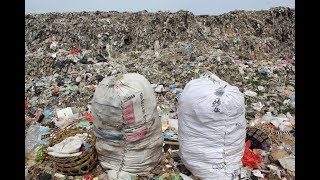Hari Sreenivasan: Today is Earth Day, an event that began in 1970 and is often considered the beginning of the modern environmental movement. This year the issue at the top of the agenda is plastic. From grocery bags to plastic straws to tiny micro-beads in everything from soap to make-up, the earth is swamped in plastic, and will remain so for generations to come. So what can be done? Joining me now is Jenna Jambeck, associate professor of environmental engineering at the University of Georgia, who is marking this Earth Day at a conference and joins us from Tel Aviv. Thanks for being with us. So let's kind of put this in the perspective. What is the scale of our plastic problem or situation?
Jenna Jambeck: In 2015, we were able to estimate the input of plastic from our mismanaged waste around the world, and into the ocean, and that is equal to about eight million metric tons of plastic entering the oceans every year. So if you think about it, that's equal to about a dump truck of plastic every minute going into the ocean. It's very significant.
Hari Sreenivasan: Is there anything that we know about plastic that gives us any kind of hope, how long does it take for plastic to dissolve or degrade, as it sits in our oceans?

Jenna Jambeck: It really doesn't ever biodegrade that we're aware of. And what it does instead is fragment over time into smaller and smaller pieces. So a large plastic item then ends up as many small microplastic items.
Hari Sreenivasan: And these microplastics i'm assuming they end up inside aquatic lifebecause they think it's food?
Jenna Jambeck: Certainly some of this is very much like food that animals in the marine ecosystem eat. And then we know that even some of the smallest items like the microbeads can be consumed by some of the smallest animals in our food web like zooplankton.
Hari Sreenivasan: when you think about a dump truck of plastic every minute, what is the impact that you and I can have or any human being can have on that kind of quantity? What are steps that we can actually take that reduces that?
Jenna Jambeck: Reusable water bottle, reusable coffee mug, don't use a straw, a reusable bag, I know we've heard them before, but our research really shows, taken collectively, or you just making this choice over a period of time, those choices really have an impact.
Hari Sreenivasan: Is there an agreement around the planet? I mean, you see local communities deciding to ban plastic shopping bags or charge higher for them. Has the world started to figure that out, especially in developing countries?
Jenna Jambeck: Yeah, I think we're all at different stages around the world, and many of these solutions are very locally based, but at the same time yes, I think we can all around the world agree that we don't want plastic in our environment, in our ocean. The U.N. has a campaign and folks around the world can sort of state their commitments that they're having to help with this issue. And so they might be different, but everyone can commit to doing something.
Hari Sreenivasan: Are there any technologies on the horizon that might be good substitutes for plastic that might be less harmful to the planet in the long term?
Jenna Jambeck: We are looking at polymers at the University of Georgia new materials institute that will biodegrade, actually biodegrade, but also serve some of the needs of plastic. So you can think of something more like a paper. Of course these things still need to be managed within our waste stream, but I do think that thinking about new materials and product design is a very important step that's way upstream of thinking about solving this problem.
Hari Sreenivasan: all right, Jenna Jambeck, associate professor of environmental engineering at the University of Georgia joining us on earth day, thank you so much.
Jenna Jambeck: Happy Earth Day.












